|
Genres, Themes, Actors, and Directors:
- Ernest Borgnine Films
- Joan Crawford Films
- John Carradine Films
- Mercedes McCambridge Films
- Nicholas Ray Films
- Outlaws
- Rivalry
- Sterling Hayden Films
- Strong Females
- Ward Bond Films
- Westerns
Response to Peary’s Review:
As Peary writes, “Nicholas Ray’s legendary baroque western” is an “amusing parody of the ‘classic’ western; high camp; an homage to Fritz Lang’s Rancho Notorious; [and] a fifties youth-gang picture with adults playing teen parts”. Primarily, however, “it is a serious indictment of McCarthyite mob hysteria and bigotry”, one that attacks “the reactionary American political climate of 1954 by subverting what had always been a politically conservative genre”. He points out that “every character represents a political faction: left-handed Kid is the community; Vienna [Crawford] is a [‘foreigner’] who is pushed to side with the ‘communists’; … [and] Emma [McCambridge] is presented as a witch (dressed in black), the head of the witch-hunt, who uses fear and power to destroy the careers of rivals”. The remainder of Peary’s fascinating analysis — excerpted from his lengthier essay in Cult Movies — goes into even more detail about all the ways in which Johnny Guitar metaphorically represents HUAC-era America.
In his review, Peary also discusses the many “dialectically opposed forces in confrontation” in the film: “the future (civilization) vs. the past; progressives vs. conservatives (those who oppose the railroad); … the law vs. mob rule; … the emotionally and sexually self-assured (Vienna) vs. the unbalanced, sexually repressed (Emma); … and decency and goodness (what America stands for) vs. evil (Emma and those like her who represent the true threat to American ideals)”. Additionally, he comments on the rife “sexual symbolism” throughout the film (“guns, safes, staircases”) as well as the clever building of tension through constant repression of “violence, [both] symbolic and real” as “characters make threats but confrontations are postponed”.
Overall, Peary asserts that the film is “great fun” — perhaps most especially through Crawford’s memorable lead performance, in which her every movement, every statement, every expression, and every outfit is DELIBERATE. Speaking of Crawford, reading about her experiences while making Johnny Guitar offers invaluable insights to fans; the following lengthy excerpt from TCM’s article is worth citing in full:
Like their on-screen characters, Joan Crawford and Mercedes McCambridge were fierce rivals on the set as well. Crawford, whose professional jealousy of younger actresses was well known, initiated the feud after she angrily observed the director, cast, and crew applauding Mercedes’ scene where she addresses the posse. Ray later admitted, “I should have known some hell was going to break loose.” Later that night, an inebriated Joan Crawford was seen by the director stumbling along the highway. In her wake was a long trail of objects that he recognized as costumes and clothing belonging to McCambridge; Crawford had obviously raided the younger actress’ dressing room in a drunken rage. The very next day Crawford demanded major changes to the screenplay – favoring her – and had them approved since she was the star of the film. The major revision was an issue over gender. Instead of Johnny Guitar and the Dancin’ Kid as the central focus, Vienna and Emma would take center stage in the more traditionally masculine roles.
It’s no wonder that the article quotes director Ray as saying, “Quite a few times, I would have to stop the car and vomit before I got to work in the morning” (!!!). Thankfully, Ray persisted with his “brilliant filmmaking”, culminating with the highly memorable “gunfight between Vienna and Emma”, but with much to enjoy throughout.
Redeeming Qualities and Moments:
Must See?
Yes, as a cult favorite. Nominated as one of the Best Movies of the Year in Peary’s Alternate Oscars.
Categories
(Listed in 1001 Movies You Must See Before You Die)
Links:
|
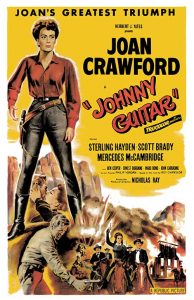

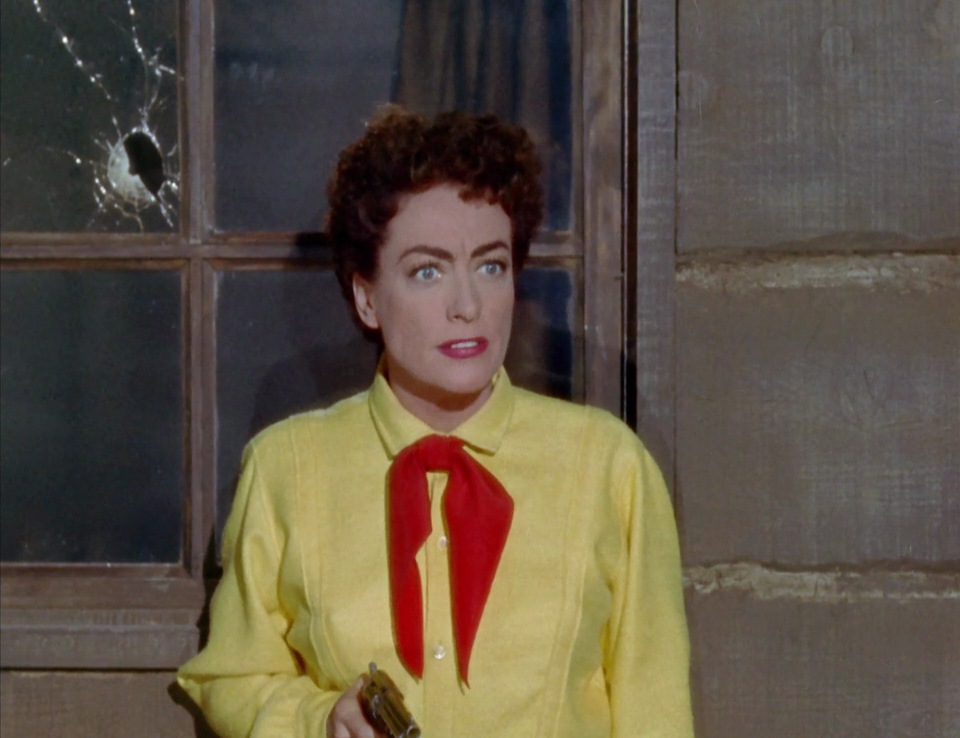
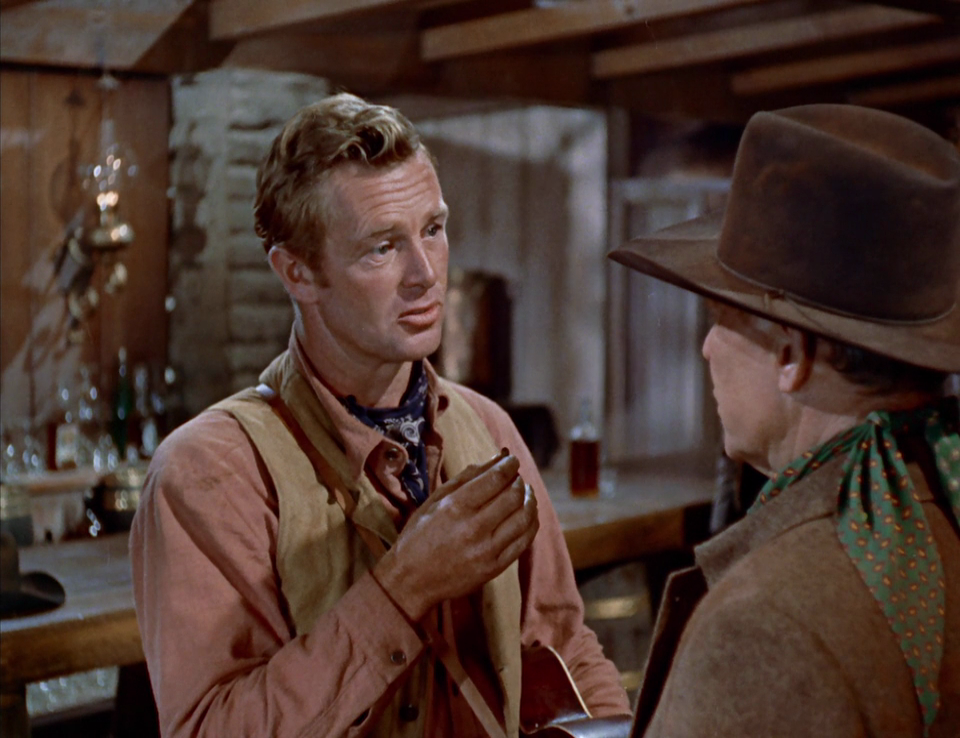
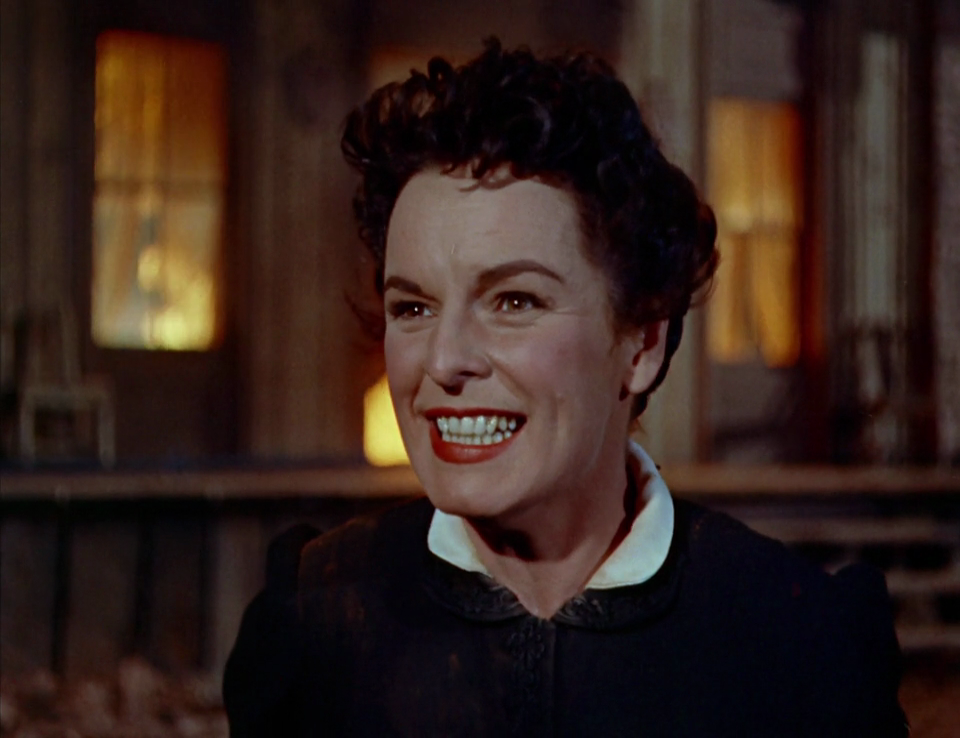
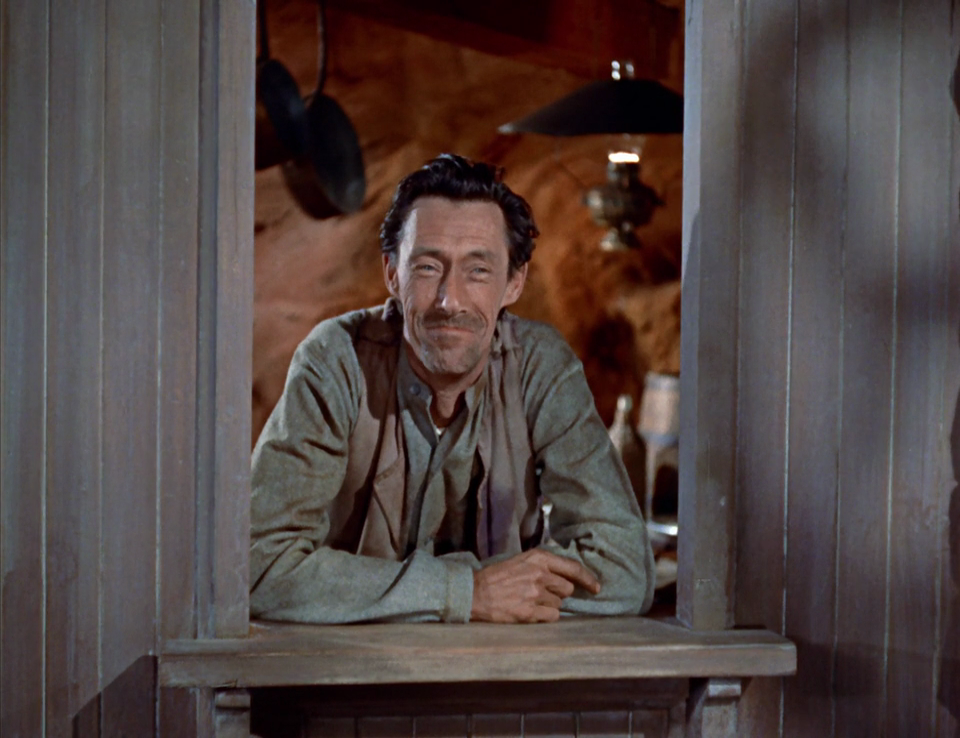
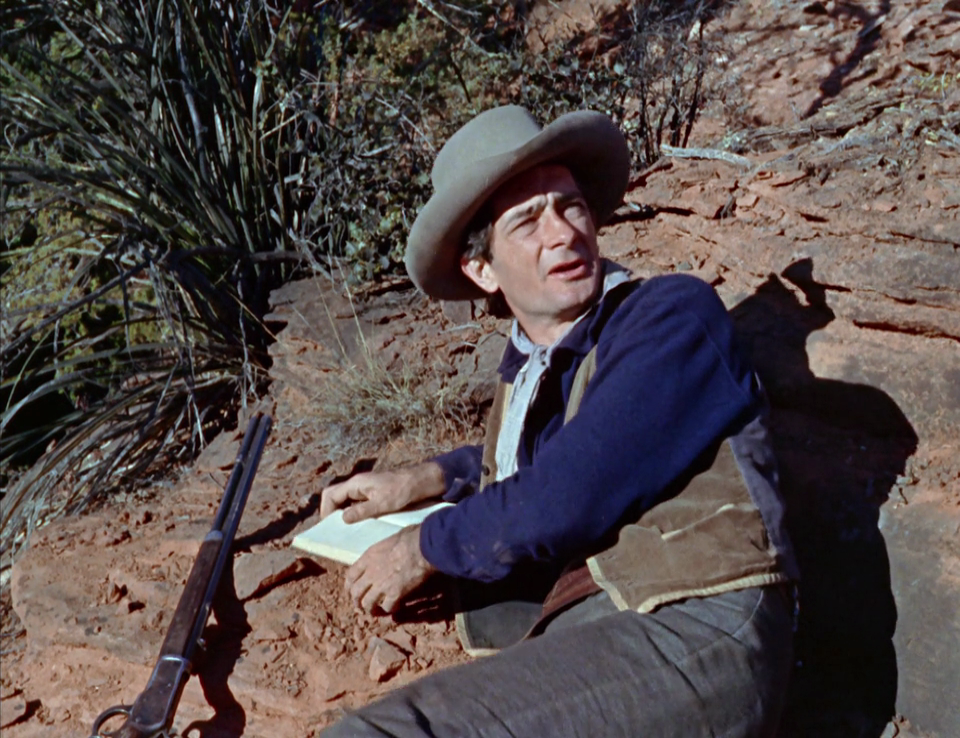
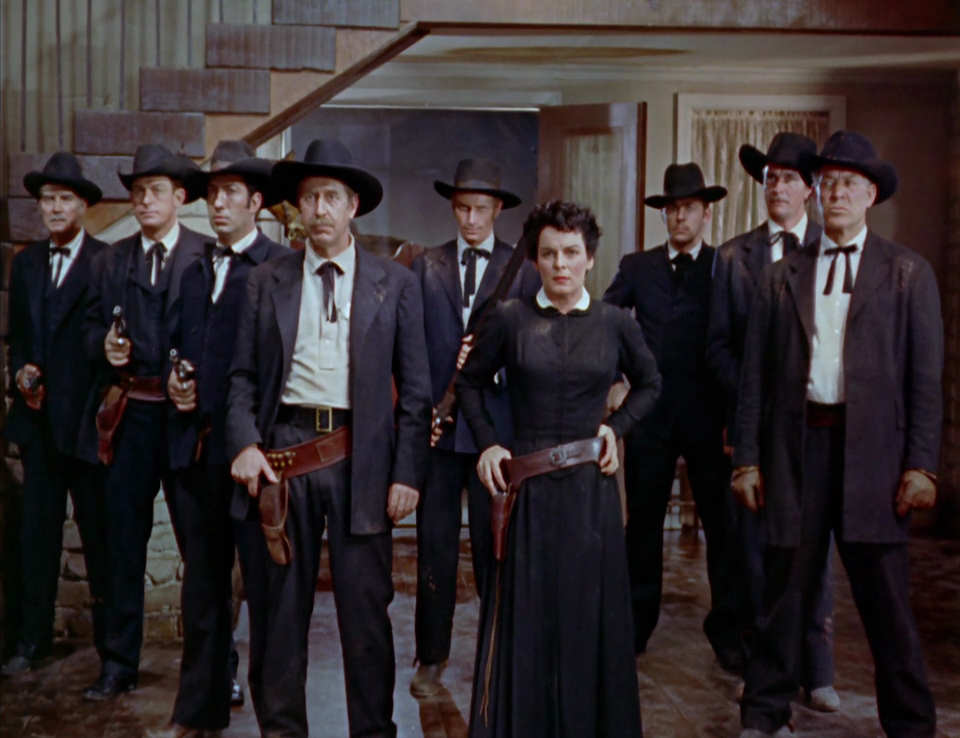
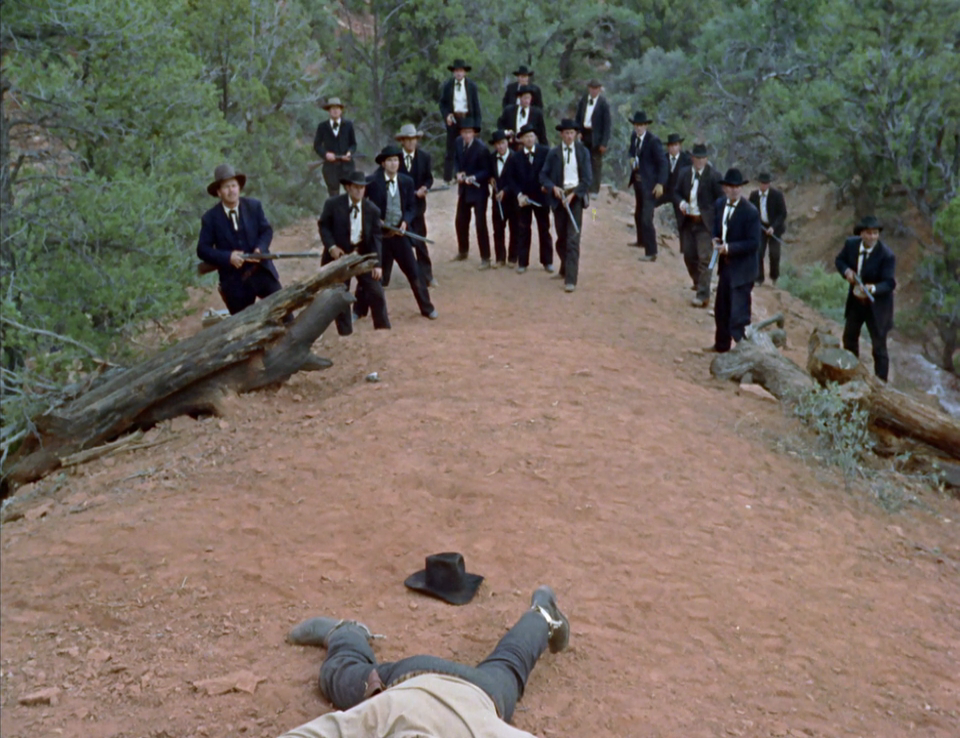
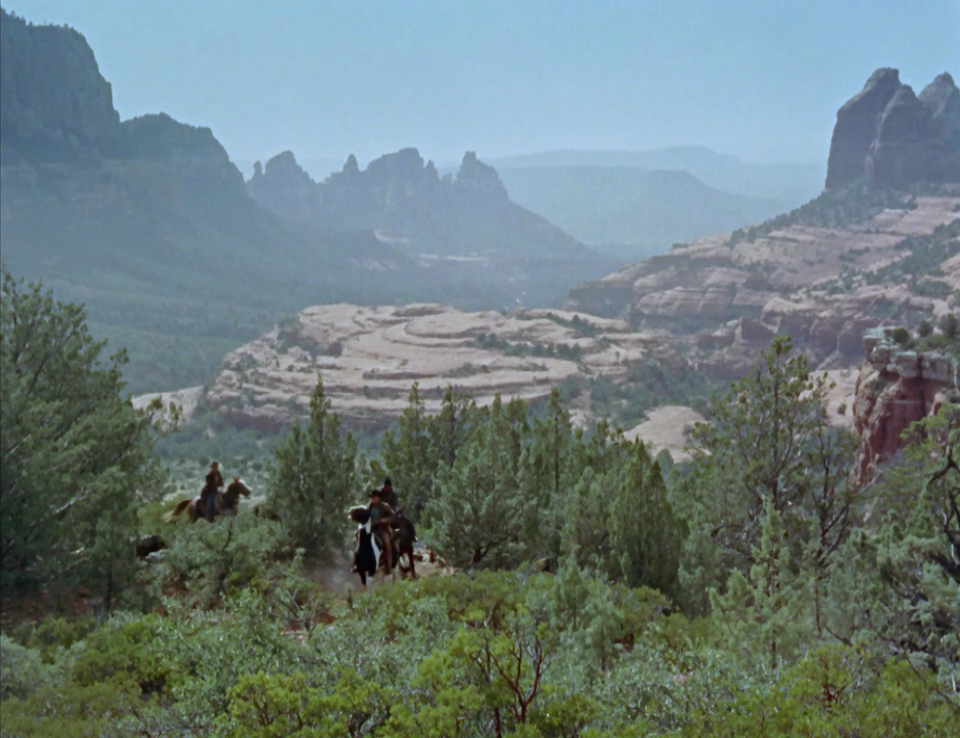
2 thoughts on “Johnny Guitar (1954)”
A no-brainer must, as a revered cult classic.
I just rewatched this – in a 4K-scan blu-ray that is remarkably vibrant and which gives the film new energy. Not that the film itself needs more energy as is – but the enhancement does add power.
So much has been written about ‘JG’; it is a film that has been studied extensively – and no doubt that will go on for some time; the film easily lends itself to that. The blu-ray disc contains (not only a helpful commentary but) several extras focused on film scholars who bring out many of the salient points re: the film’s considerable value.
Some of what has been placed onto the film over the years may not exactly be valid but – since ‘JG’ is not a film intent on explaining itself thoroughly (which adds immeasurably to the film’s power) – if it works for the viewer, well, why not?
Still, for example, I don’t personally agree with one school of thought brought out by gay scholars: I don’t really think the film supports the idea that McCambridge’s Emma could be secretly (and perversely) in love with Crawford’s Vienna. I’ve seen this film many, many times and I find that idea wishful, camp thinking. Even though director Ray was bisexual (and such sentiment can be found in his work), I still don’t think it holds here (esp. if one pays close attention to the dialogue throughout).
(That said, it would be intriguing to learn from Ray himself – somehow – what exactly, in the making of the film, was intentional and what wasn’t.)
When people were watching movies in theaters decades ago, all they mostly had, of course, were the films…except for movie mags which were mostly gossip rags with invented tales about the stars, served up for publicity purposes. Now, when we watch films, we have so much info to supplement them – in a number of cases, too much info. We now, for example, know that making ‘JG’ was an unhappy experience for Ray and the cast and crew in general…largely because of Crawford.
The irony there, though, is that, if Crawford hadn’t been that insufferable, ‘JG’ would not nearly be the mesmerizing film that it is. Does that excuse Crawford? Not at all. But this is why art is something very much apart from how it is created or the people who create it. In their own lives, people will be made accountable for what they do – and may burn bridges with fellow artists…but the art itself may very well still stand. In the case of ‘JG’, it stands strong and firm.
‘JG’ may be the end result of people often working on their last nerves but it is largely to Ray’s credit that we don’t sense that for a second. (Talk about mind over matter.) What we have been given is a western that is simply like no other western ever made: it follows many of the standard rules of classics like ‘High Noon’ but it holds the unique position of being simultaneously female-dominated and almost achingly psycho-sexual (as much as that was possible in the ’50s).
The film clocks in at just under 2 hours yet, to me, the time always seems to fly by. The pacing alone is admirable. There are no lulls, even when certain scenes are slower and more deliberate.
Visually, ‘JG’ is simply a striking film – the bold color schemes and the attention to the heightened look of what, in many ways, is essentially a modest western are effective throughout.
‘JG’ may have been a particular ordeal to create but, for its fans (and I am a big one) it is one of cinema’s happiest unhappy accidents.
One of my favorite westerns. A film which modern critics love to write about , calling it ‘bizarre’, ‘operatic’, ‘subversive’, ‘ a very strange film’, ‘twisted’, a Freudian psychodrama’.
What am I missing! I think it’s beautifully filmed with a strong plot, cast and settings.
Still, many of the leading characters bite the dust! – Tom, Turkey, Corey, the Kid and Emma.
One review in 1954 didn’t mind giving away the finale – “Miss McCambridge, after failing to have Miss Crawford lynched, loses her life in a gun duel with her.”
Only at the end of the movie do we hear Peggy Lee sing the haunting title song she wrote with Victor Young. Relatively simple lyrics but that beautiful arrangement by Young.
Not quite the burning of Atlanta, but Vienna’s saloon going up in flames is well done. Emma takes maniacal delight in destroying it.
One of the best lines in the film, after the train company executive, Mr. Andrews , asks Vienna how she knew the train route was to come through the land she owns:
“ I ran into your surveyor – we exchanged confidences!”